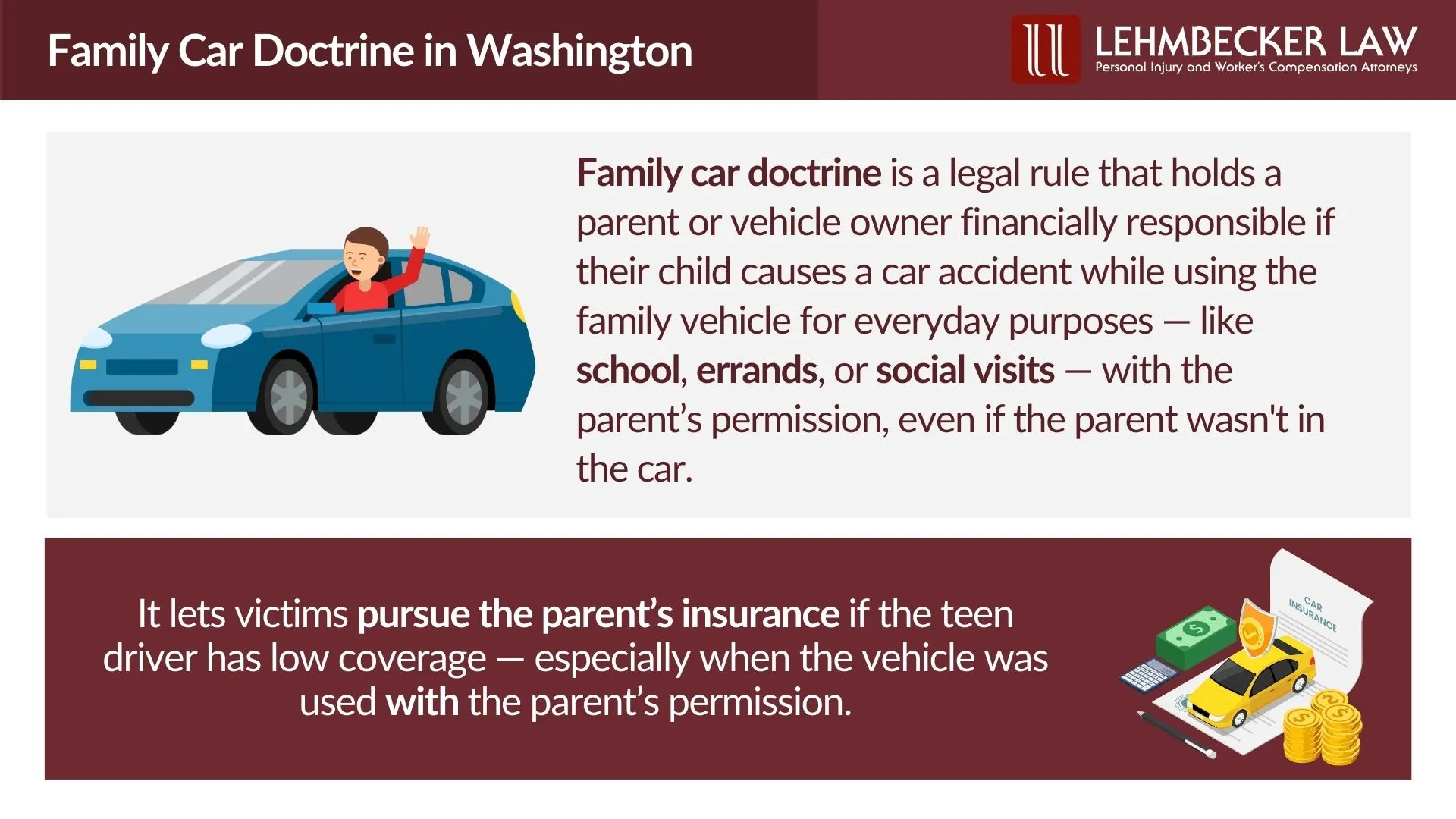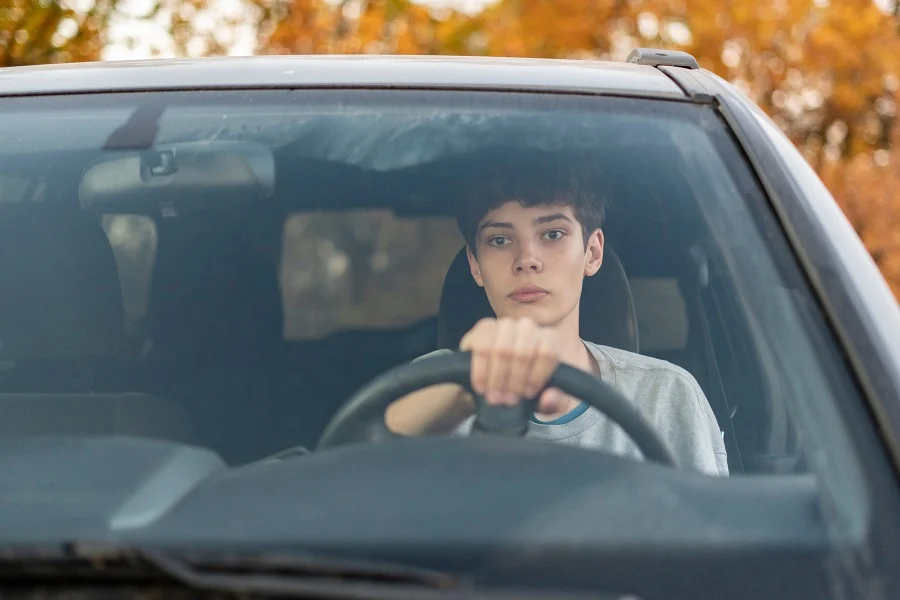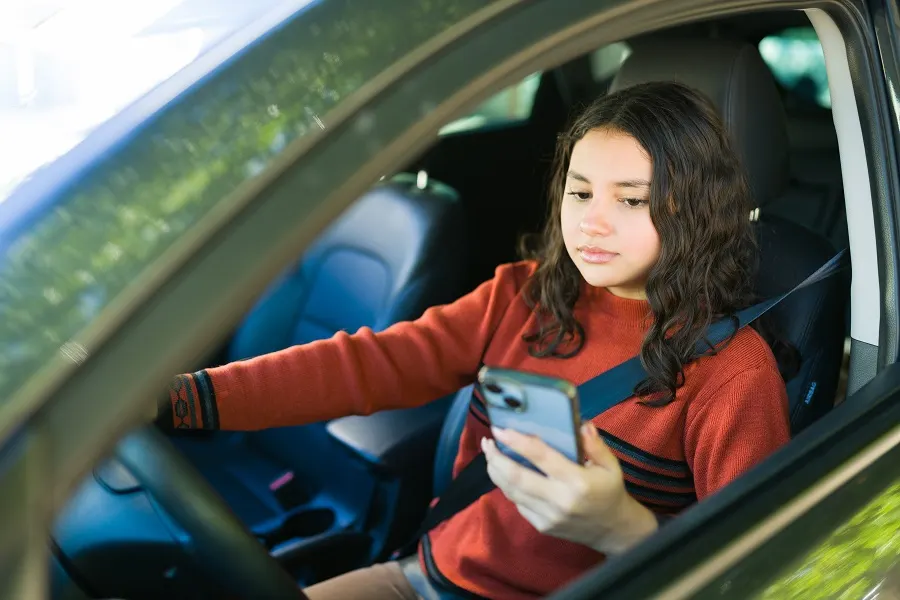There is no fee unless we win!
EN

- EN
- ES


You were injured in a car accident, and the driver who hit you turned out to be a teenager. Maybe they were distracted. Maybe they ran a red light. Either way, you're dealing with injuries, medical bills, and car repairs. And then you find out something frustrating: they don’t have the money or coverage to pay for any of it.
So what now? Are you stuck with the costs? Or can someone else be held legally responsible, like the teenager’s parents?
Fortunately for you, Washington has a family car doctrine, under which parents can be held responsible for damages their minor child causes while driving the family car with their permission. In this article, we’ll cover what that means for your case.

The family car doctrine (also called the family purpose doctrine) is a legal theory that allows accident victims to recover damages from the person who owns or controls the family vehicle — often the parent — when a family member causes a crash.
RCW 46.16A.500 states that anyone who operates a vehicle “with the express or implied permission of the owner” and the vehicle owner themself can both be held responsible for any unlawful acts or omissions.
If a parent allows their child to regularly use a car for daily family needs (like going to school, running errands, or socializing), and that child causes a wreck, the parent may be held liable for your injuries and damages, even if they weren’t in the car when the accident occurred.
Why does this matter? Because teenagers and other young drivers often have limited assets and minimum insurance coverage. If your personal injury claim exceeds what their policy covers, you need a way to pursue additional compensation, and that often means looking at the parent or other family member who owns the vehicle.

This depends on the facts of the case, but courts usually look at a few key factors:
If the answers to these are yes, there’s a strong chance the family car doctrine applies, and the parent can be held financially responsible.
Often, yes, but it depends on the insurance coverage and whether the child was listed on the policy. If the car is a family vehicle, the parents’ liability coverage may apply even if the child has their own policy.
But insurance companies love to shift blame or argue that the driver didn’t have permission, especially when large claims are involved. They might claim:
This is where having a legal team makes a real difference, because these arguments can be challenged with the right evidence.
Let’s say you’re rear-ended at a red light. The driver is a 17-year-old high schooler in her parents’ SUV. You suffer a neck injury, and her policy only covers $25,000, but your medical bills are already higher than that.
In this situation, your attorney could argue that the SUV was a family vehicle used with the parents’ permission, and that the crash falls under the family car doctrine. That could open the door to filing a claim against the parents’ policy, which might carry $100,000 or more in liability coverage.

In some cases, the parent may not only be liable due to the family purpose doctrine, but also because of a concept known as negligent entrustment.
That means they knowingly allowed someone dangerous to drive — for example, a teenager with a suspended driver’s license, a history of reckless driving, or a poor driving record.
If it’s clear that the parent should have known better, they can be held directly responsible for putting others at risk.
Winning a case under the family car doctrine requires more than just pointing at a teenager behind the wheel. You'll need evidence showing:
Our experienced lawyers can gather statements, insurance policies, and testimony to build this case. Without that, the insurer might try to dodge responsibility.
However, courts don’t always apply this doctrine automatically. There can be exceptions, for example:
The insurance company will have a team of adjusters, investigators, and lawyers fighting to pay you as little compensation as possible, or even none at all. You deserve to have an aggressive team in your corner fighting for your rights. That’s where we come in.
.webp)
If you're the victim of a car accident involving a minor, don’t assume the teen’s low-limit insurance policy is all you’re entitled to. If your damages exceed their policy limits, or if they don’t have insurance, you may be able to turn to your own uninsured/underinsured motorist coverage. Still, your insurer may challenge the claim, which is why having a legal team on your side can make all the difference.
There may be a clear path to hold the parents accountable through vicarious liability laws, especially if they provided the vehicle and allowed their child to use it for everyday purposes.
You shouldn’t have to carry the financial consequences of someone else’s bad decision-making. Whether you’re dealing with property damage, medical bills, or lasting injuries, you deserve full compensation, and that often means looking beyond just the negligent driver.
While the family car doctrine applies to minor children, you may wonder whether similar liability can extend to adult children.
In some cases, it does. Parents can still be held financially responsible for accidents caused by their adult children if those children are considered legal dependents for some reason and are claimed as dependents on the parents’ tax return. This applies even if the adult child owns the vehicle and has their own insurance policy.
If you've been injured in a crash caused by a teen driver or family member using a household vehicle, our team is here to help.
Our Seattle car accident lawyers at Lehmbecker Law have helped countless accident victims recover the compensation they need to move forward, even in the most complex legal situations. We’ll investigate the car doctrine and whether the family purpose doctrine applies, deal with the insurance company, and fight to hold all liable parties accountable.
Don't face this alone — contact us to get the support you need to protect your rights and get your life back.

Contact us if you considering insure you and your family and we'll help you pick up most efficient insurance policy!